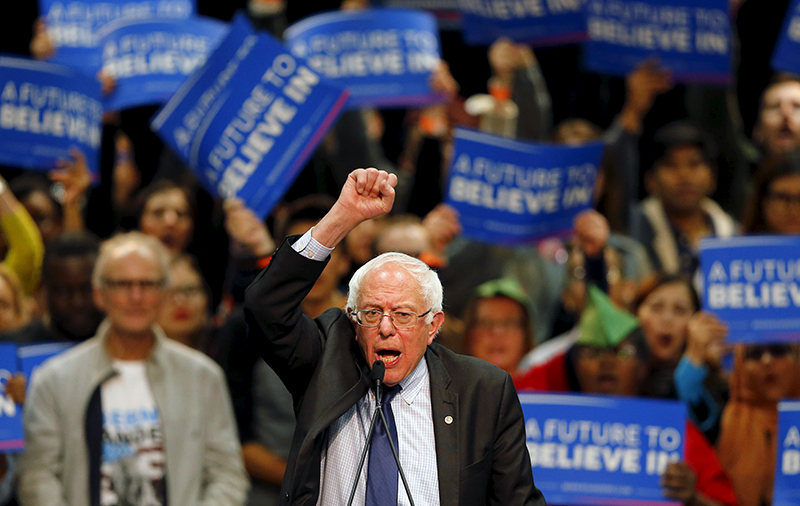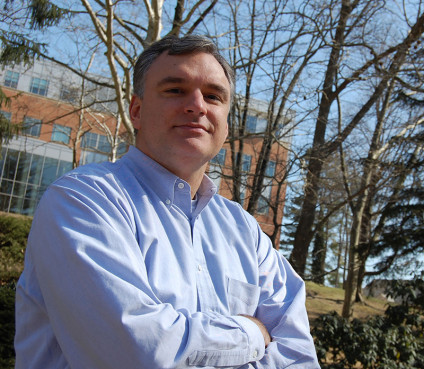
Democratic presidential candidate Bernie Sanders holds a campaign rally in San Diego on March 22, 2016. Photo courtesy of REUTERS/Mike Blake
*Editors: This photo may only be republished with RNS-FEA-COLUMN, originally transmitted on March 23, 2016.
(RNS) Bernie Sanders’ political revolution rolled on Tuesday night with crushing victories over Hillary Clinton in Utah and Idaho. While it will be difficult for the Vermont senator to catch Clinton in the delegate race for the Democratic Party’s presidential nomination (Sanders lost to Clinton in Arizona on Tuesday), he continues to preach a political message that is resonating with large numbers of voters.
It is a message that is deeply religious.
Over the last several months, reporters have asked Sanders to explain his religious beliefs. Here is how he responded to such a question from CNN’s Chris Cuomo during a recent town hall meeting:
“Every great religion in the world — Christianity, Judaism, Islam, Buddhism — essentially comes down to ‘do unto others as you would like them to do unto you.’ And what I have believed in my whole life (is) that we are in this together. … The truth is, at some level when you hurt, when your children hurt, I hurt. And when my kids hurt, you hurt.”
Sanders’ approach to faith and our life together in this world is different from what we are hearing from nearly all the people who are still running for president.
The Republican candidates talk about faith in terms of self-interest. They quote the Declaration of Independence to remind their followers that rights come from the Creator and thus must be protected.
Until very recently, Hillary Clinton rarely framed her political message, or her talking points about growing up Methodist, in terms of the common good.
Sanders’ comments about faith echo three distinctly American voices.
1. He sounds a lot like Barack Obama.
On June 25, 2015, the day the Supreme Court upheld the Affordable Care Act, Obama invoked a message similar to what Sanders has been saying on the campaign trail:
“That’s when America soars — when we look out for one another. When we take care of each other. When we root for one another’s success. When we strive to do better and to be better than the generation that came before us, and try to build something better for generations to come. That’s why we do what we do. That’s the whole point of public service.”
Throughout his two terms as president, Obama stressed civic responsibility and our duty to take care of our fellow human beings. Government is not a “necessary evil,” as Thomas Paine said at the beginning of “Common Sense,” but a force for good. It has the responsibility of maintaining peace and providing the necessities of life — food, education, health care. These convictions stem from Obama’s Christian faith.
2. Sanders also echoes the American socialists who came before him.
According to historian Nick Salvatore, Eugene Debs, a five-time presidential candidate and the 20th century’s most prominent socialist, believed that big corporations were hurting American democracy because their leaders were motivated by greed, rather than a commitment to the economic well-being of all citizens. The problem with the country, Debs and his fellow socialists argued, was that citizens did not understand, to quote Sanders, that “we are in this together.”
Debs was not a particularly religious man, but he drew heavily on evangelical Christianity and the Bible to formulate his understanding of equality.
READ: Ted Cruz’s campaign is fueled by a dominionist vision for America (COMMENTARY)
By emphasizing community alongside individual rights, Obama and Debs tapped into a long-standing American tradition. The tradition that drives the Sanders campaign today does not come from Denmark or Sweden.
3. Sanders’ way of thinking about society comes from our Founding Fathers.
The founders knew from their study of history that a republic is only successful when its members are willing to take care of one another. This requires individuals to temporarily lay aside their rights and interests in order to serve their neighbor, their community and the common good.
Sometimes the founders’ language of citizenship sounds foreign, if not dangerous, to a 21st-century culture that is drunk with liberty. For example, the Boston patriot Samuel Adams said that a citizen “owes everything to the Commonwealth.” In 1776, an unnamed Pennsylvania revolutionary proclaimed, “No man is a true republican … that will not give up his single voice to that of the public.”
If Benjamin Rush, the Philadelphia doctor and signer of the Declaration of Independence, were alive today he would probably be labeled a socialist.
Here is what Rush had to say about the purpose of education in a republic:
“Let our pupil be taught that he does not belong to himself, but that he is public property. Let him be taught to love his family, but let him be taught at the same time that he must forsake and even forget them when the welfare of his country requires it.”
READ: Yes, Catholics may vote for Bernie Sanders (COMMENTARY)

John Fea teaches American history at Messiah College in Mechanicsburg, Pa. He is the author of “The Bible Cause: A History of the American Bible Society” (Oxford University Press, 2016). He blogs daily at www.thewayofimprovement.com. Photo courtesy of John Fea
Americans could “amass wealth,” Rush argued, as long as it was used to “increase his power of contributing to the wants and demands of the state.” His vision for a thriving republic would be rejected in 21st-century America, but it should remind us that citizenship requires obligation and sacrifice to the larger society. It requires exercising the golden rule.
Bernie may not believe in God, but he certainly believes in the potential of human beings to create a more just and democratic society. And in this sense his religious beliefs are decidedly American.
(John Fea teaches American history at Messiah College in Mechanicsburg, Pa. He is the author of “The Bible Cause: A History of the American Bible Society” (Oxford University Press, 2016). He blogs daily at www.thewayofimprovement.com)




